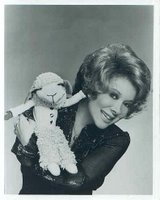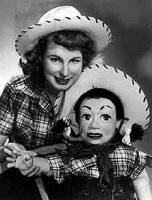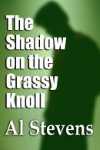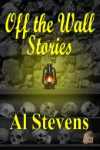He said, she said, or he or she said...
Most ventriloquists are men and most ventriloquist dummies are male. During the so-called “golden era” of ventriloquism there were many well-known male ventriloquists but only one really famous female, a talented and beautiful ventriloquist named Shari Lewis.

Another lady ventriloquist from that era is Shirley Dinsdale, the fifteen year old whose puppet Judy Splinters won the first Emmy ever awarded; her award was in the category, Most Outstanding Television Personality. Dinsdale never achieved the fame that Lewis did, and so the public is mostly unaware of her.
That's it. That's all there are. Only two prominent lady ventriloquists from the old days. Even today, when many ladies have taken up the art, males dominate it.
Does this minority justify an exclusive use of masculine gender? Of course not. The propriety of that usage exists in the rules of formal English language, not in superior numbers or political correctness.
First, the politically correct phrases, “he or she,” “his or her,” and so on, are awkward to write and cumbersome to read. Second, they are unnecessary; the masculine gender in formal English writing has always been used to circumscribe all people without regard to their sex. The English language has not evolved to include singular gender-unspecific pronouns, probably because political correctness is a relatively young posture when compared to our centuries old social culture.
There is concern among some social commentators, particularly feminists, that use of the masculine gender reflects and engenders socio-economic biases against their constituency, members of the female sex. They worry that little girls, reading only male pronouns, come to feel subordinated and disenfranchised, whereas little boys come to believe in male superiority.
Certainly such feelings can exist between the sexes, but they are hardly the product only of masculine gender in writing. If such problems are real and such concerns valid, we do not adequately address them by reinventing written language. Rather, we properly educate our children about correct English usage and condition them not to get their panties in a bunch about every imagined slight they might encounter in life.
Like it or not, there are certain professions that virtually all people, women included, assume are white male-dominated. If you talk about your doctor, lawyer or English professor, for example, people subconsciously assume that the person you are discussing is a white male unless you specifically identify the sex and ethnic origin of your doctor, lawyer or English professor. Similarly, if you tell a friend that you saw the performance of a ventriloquist, juggler, magician, or comedian, and do not name the performer, your friend mentally pictures a white male as the performer. Such biases do not exist in language; they exist in people. There's not a lot we can do about human nature. Saying “he or she” all the time doesn't change anything.
Another common usage these days is to balance your pronouns equally between the masculine and feminine genders, using “he” in some places and “she” in others. I don't care for that practice either. It calls attention away from the subject matter and to the notions that a social issue exists related to gender in writing and that the writer is ever so politically correct. The writer changes the focus from his message, whatever it is, to some subliminal social commentary.
If all this troubles you, keep in mind the characteristic role of the ventriloquist dummy as an irreverent commentator who ignores the rules of polite society when it suits him. This socially-imposed gender sensitivity is exactly the kind of up-tight, politically correct nonsense with which Charlie McCarthy would have had a field day.










0 Comments:
Post a Comment
Subscribe to Post Comments [Atom]
<< Home